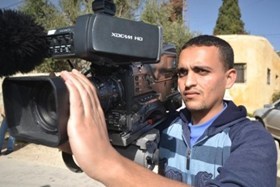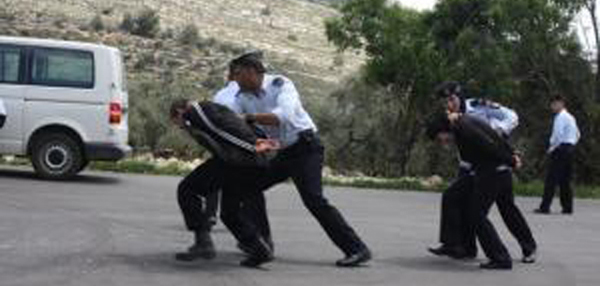Torture allegations against the treatment of Palestinians detainees in Israeli prisons make headlines again. Few days after his arrest, Arafat Jaradat died in Israeli custody. On 27 February 2013, the United Nations Special Rapporteur for human rights in the Occupied Palestinian Territories, Richard Falk, called for an international investigation on the death of Palestinian prisoner Jaradat while undergoing interrogation in an Israeli facility. Falk stressed that “the death of a prisoner during interrogation is always a cause for concern, but in this case, when Israel has shown a pattern and practice of prisoner abuse, the need for outside, credible investigation is more urgent than ever. The best approach might be the creation of an international forensic team under the auspices of the UN Human Rights Council.”
The violations of the human rights of the Palestinians by the Israeli occupying forces have not decreased despite the peace process and there is no difference between the Labor Party and the Likud bloc. The list of the offenses is long: torture, arbitrary killings and arrests, the demolition of houses, the severe restrictions imposed on the freedom of movement by hundreds of check points, violence against Palestinians, land confiscation and the construction of illegal settlements, the “ethnic cleansing” of the Palestinians from East Jerusalem, collective punishments, such as the total closure of the territories like Gaza and curfews, and the bombardments of the people of the Gaza Strip.
The list of human rights violations involving Palestinian victims for which the Palestinian Authority (PA) is responsible is similarly long: torture and maltreatment, the denial of fair trials before military courts and the State Security Court, which has the power to issue the death sentence, the intimidation of undesirable persons, the restrictions on the freedom of speech and the press, and the hampering of the work of human rights organizations. Both the Fatah- and the Hamas-led governments use repressive measures in order to control and subdue the population under their reign. After Israel began its offensive in Gaza in 2008/09, Hamas took extraordinary steps to control, intimidate, punish, and at times eliminate its internal political rivals and those suspected of collaboration with Israel. The majority of Palestinians executed by other Palestinians during Israel’s military operations were men accused of collaboration with Israel.
However, one should not forget that the prime cause of these massive violations is the illegal occupation of Palestinian land by the State of Israel. Since the start of the Zionist colonial enterprise, the Zionist movement and later Israeli governments strove to bring as much Palestinian land as possible under their control, but with the least possible people.
Tradition of Torture in Israel
Torture in Israel has a long tradition, dating back to the “Haifa Trials” in 1972.
Western media outlets have only reported sporadically about this widespread phenomenon. The torturers are usually Shin Bet agents (Shin Bet=General Security Service GSS) who run special interrogation sections in some Israeli prisons. In June 1993, I attended the first conference on torture in Tel Aviv organized by “Physicians for Human Rights (PHR)” and the “Public Committee against Torture in Israel (PCATI)”. Neve Gordon, then general secretary of PHR and currently professor for Political Science at Ben-Gurion University in Beer-Sheva, declared at the final press conference that 25 to 30 per cent of the detainees were mistreated during interrogation. Stanley Cohen, then professor at Hebrew University in Jerusalem, said that a “society that tolerates such practices, requires self-immunization. Although torture has become routine, the public is not informed, and they do not even want to know.”
The publication of the report “
On Torture” shows that Cohen’s statement 20 years ago still holds true.
In April 2011, Adalah – The Legal Center for Arab Minority Rights in Israel, Physicians for Human Rights (PHR-Israel) and Al Mezan Center for Human Rights in Gaza held a two day international expert workshop in Jerusalem on the subject of “Securing Accountability for Torture and Cruel, Inhuman or Degrading Treatment or Punishment (CIDT) in Israel: New Trends and Comparative Lessons”. Israelis, Palestinians and international experts discussed whether existing domestic mechanisms of torture and ill-treatment prevention were sufficient and whether the perpetrators could be held accountable. This volume presents the results of this conference. Torture and ill-treatment inflicted by the Fatah- and Hamas-led governments were ousidet the scope of the joint work of these organizations and did in no way intend to undermine the gravity of such acts or suffering of the victims. There are several Palestinian human rights organizations in the Occupied Palestinian Territories (OPT) that address these violations.
In the aforementioned report, Lea Tsemel, a leading Israeli human rights lawyer, gives a rundown on the history of torture in Israel. The two main bodies that carry out torture are the GSS, which continues to do so up till now, and Military Intelligence. The latter is involved in the interrogation of detainees kidnapped abroad or had infiltrated the country. The vast majority of the interrogation takes place in GSS centers. According to advocate Tsemel, the Israeli public was first informed of torture practices in 1977, after the New York Times published an article containing testimonies by young and old Palestinians who were subject to torture. After the Nafso case in 1980 and the Bus 300 affair in 1984, the Israeli government established the Landau Commission, named after a former High Court Judge David Landau. It came up with a list of authorized and prohibited methods of coercion. Despite these recommendations, torture continued unabated till 1999, when the Israeli High Court found that torture was practiced, and stated that it was illegal. It suggested, however, that torture could be permitted in situations of “necessity”.
According to Lea Tsemel, torture was sub-contracted to Palestinian collaborators. These Palestinian “friends” are known as “birds” (Asafeer). The results of their violent interrogations are recorded and later taken to the GSS agents. The detainee is later confronted with this “evidence”. These “friends” have an advantage over GSS interrogators, because they remain secret and do not fall under the direct jurisdiction of Israeli law.
Torture permission is required in cases of the “ticking bomb” doctrine of “necessity”, as envisaged by the High Court, writes Lea Tsemel. In so-called “military investigations” the definition has been broadened to justify torture of a person who merely “knows someone who may know something” about an upcoming danger. No permission is needed in cases that are not regarded as “soft” torture, like shouting, threats against the detainee and his or her family, or spitting at their faces. Another mechanism is the lie detector machine and the total isolation of the suspect. In this surreal world people are totally lost.
The founding member of PHR in Israel, Ruchama Marton, spoke of the involvement of Israeli physicians in the torture and ill-treatment of detainees. She mentioned that the involvement of medical personnel in such unethical behavior is not exclusive to the Israeli-Palestinian conflict, but represents rather a worldwide phenomenon. According to her opinion, the medical system functions as an agent of social oversight, regulation and control. “Israeli Prison Service physicians provide medical authorization for the solitary confinement and isolation of prisoners,” she said. Psychiatrists have brought about the continued incarceration of detainees in solitary confinement, causing unequivocal and sometimes irreversible harm to their health, writes the author. Instead of healing, they cause harm.
Manfred Nowak, Professor of International Law and Human Rights at the University of Vienna, and a former UN Special Rapporteur on Torture, gave an overview of the progress and the setbacks during his tenure. There is an urgent need “for hard international law to protect and promote the rights of detainees”. In Nowak’s opinion, the “most important preventive means are visits to places of detention”. And the international monitoring has to be strengthened. Nowak mentions the negative example the Bush administration gave by using torture in its detention facilities. Other governments asked: Why can’t we do the same? Unfortunately, the British authorities already used torture against IRA suspects in the 1970s. With their “ticking bomb”doctrine, the U. S. and their torture supporters have been trying “to make torture socially acceptable”, writes Nowak.
According to the Israeli human rights organization B’Tselem, more than 700 Palestinian detainees have filed complaints against Shin Bet agents for mistreatment during interrogation over the last decade; however, not a single one has resulted in a criminal investigation being opened. In violation of the Fourth Geneva Convention, the Israeli government transfers prisoners, including children, from the Occupied Palestinian Territories for interrogation and detention in Israeli prisons. Currently, there are 159 administrative detainees held without charge or trial in Israeli prisons; almost 4 600 Palestinians prisoners are currently held in Israeli custody. B’Tselem has reported that while incidents of physical abuse have decreased in recent years, they have not ended.
Besides torture, a wide range of other human rights violations are committed by the Israeli occupying forces against Palestinians. Despite that, Israel remains officially a democracy in which law and order and the freedom of opinion are secured, though mainly for Jews There is a huge amount of information about the ill-treatment of non-Jews; that’s why no Israeli could claim that he or she would not have known about these human rights violations.
Torture and Ill-Treatment under Fatah and Hamas
In the course of the so-called peace process in 1993 that led to the establishment of the Palestinian Authority, Yasser Arafat and later Mahmoud Abbas have been forced by Israel and the United States to take on the role of what might be called despotic peace angels. Immediately after his arrival, PLO chief Arafat established a comprehensive security apparatus that was used to intimidate, threaten, arbitrarily arrest and mistreat any critics of the peace process and members of Hamas and the Islamic Jihad. The political situation under the Abbas regime did not change fundamentally, especially, after the 2007 Fatah-instigated coup against Hamas failed.
A repressive policy by the Palestinian Authority violated the most basic rights of the Palestinians – the right to life, freedom of assembly and speech, peaceful opposition, and personal security. Torture and arbitrary arrests are the most common methods. There have also been unsolved killings. In April 2009, Human Rights Watch released a
report on Hamas political violence in Gaza. The report shows that human rights violations are manifold, including torture, extra-judicial killings, mistreatment, arbitrary detentions, and executions of alleged collaborators.
After Israel’s withdrawal from Gaza in 2005, internal violence in Gaza continued as manifested by 14 extra-judicial killings between January and March 2009. This violence has gone mostly unpunished. Only one killing by members of their security forces or armed wing was investigated. Hamas security forces have also used violence against Fatah members, especially those who had worked in the Fatah-run security services of the PA.
In the West Bank, the Fatah-run authorities have also increased repressive measures against Hamas members and their supporters. In 2009, Palestinian human rights groups recorded 31 complaints of residents who said they had been tortured by Fatah-led security forces. They also recorded one known death in custody and the arbitrary detention of two journalists from a private television station considered pro-Hamas. Besides the Fatah-led security apparatus, Israel’s occupying forces have arrested and continue to arrest both democratically elected Hamas representatives’ and ordinary Hamas supporters.
In both Gaza and the West Bank, these abuses violate Palestinian law, although the Palestinian Basic Law, considered the interim constitution, prohibits torture and mistreatment. The situation in both Palestinian areas is depressing not only because of the exerted pressure from the outside but also due to the increasing brutality of the Israeli occupation regime. Under the prevailing circumstances in Palestine, there is little hope for democracy and the respect of human rights.
More generally, however, the Israeli occupation regime bears the primary legal responsibility for these massive violations of human rights. As a belligerent occupier, Israel has special responsibilities under international humanitarian law to deal humanely with all Palestinians including those held in detention. The international community bears responsibility under common Article 1 of the four Geneva Conventions to “respect and ensure respect” for those conventions “in all circumstances”. It is the duty of the State of Israel to respect these international conventions and that of the other states to “ensure” that Israel abide by these conventions.








 The EU has financed the construction of a number of jails in the Occupied Palestinian territories, and the EU has a police unit stationed in Ramallah, the so-called “
The EU has financed the construction of a number of jails in the Occupied Palestinian territories, and the EU has a police unit stationed in Ramallah, the so-called “








